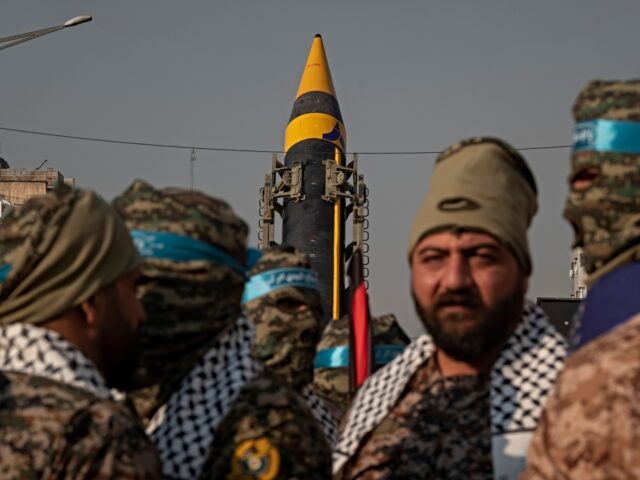Multiple reports on Tuesday indicated the governments of Jordan and Saudi Arabia communicated to rogue terror sponsor Iran it could not use their airspace to attack Israel in response to the elimination of Hamas “political” chief Ismail Haniyeh.
The Middle East is anticipating a major attack on Israel by Iran in response to Haniyeh’s killing. Iran itself is repeatedly threatening to execute its “holy wrath” in an imminent attack on Israel, though it has yet to make a move at press time outside of various attacks by its affiliated terror proxies.
Iran’s neighbors would not help Iran conduct missile attacks by sharing their airspace, multiple reports claimed on Tuesday. The Jerusalem Post, citing Israel’s Kan public broadcaster, reported that the Saudi government sent a “senior member” of the royal family to warn Iran that “Riyadh will not allow any foreign object to pass through” its airspace. Another report indicated that the Jordanian government did the same, notifying the Iranian regime that it would not allow any Iranian presence in its airspace for the purpose of attacking Israel. Both countries lie directly in between Iran and Israel.
The Wall Street Journal similarly reportedly that Jordan and Saudi Arabia would not help Iran attack Israel on Monday.
“Jordan, whose foreign minister made a rare visit to Tehran on Sunday, and Saudi Arabia separately informed Iran that it couldn’t violate their airspace during an attack,” the newspaper indicated.
Haniyeh, a billionaire whose main role in the genocidal terrorist organization was to galvanize support from sympathetic Islamist regimes such as those of Iran and Turkey, was in Tehran on July 31 to attend the inauguration of Iranian President Masoud Pezeshkian. He was killed in an explosion at this temporary lodging, a major blow to both the international jihadist movement and to Iran’s reputation, as its terrorist Islamic Revolutionary Guard Corps (IRGC) failed to protect one of the nation’s most prestigious guests.
The Iranian government claims that an airstrike targeted his suite in Tehran, killing Haniyeh and a bodyguard. The New York Times reported, however – citing several anonymous Middle Eastern officials – that unknown persons planted a bomb in the room where Haniyeh typically stayed in Iran two months ago and detonated it remotely while he was in the building. The explanation suggests that the IRGC failed to intercept operatives infiltrating its security on the ground. Iran has denied the report, but not produced any evidence of projectiles flying over the sky in the moments before the blast.
Iran immediately blamed the government of Israel for the killing, which has not taken responsibility for the attack. Israel declared war on Hamas in October after it orchestrated an unprecedented massacre of an estimated 1,200 people in a savage invasion of the country from Gaza that featured documented atrocities such as infanticide, gang rape, rape-executions, torture, and desecration of corpses. Haniyeh’s death occurred shortly after the Iranian proxy terror organization Hezbollah launched rockets into Israel’s Golan Heights, killing 12 at a children’s soccer game.
Warnings from Jordan and Saudi Arabia for Iran to keep out of their airspace recall reports following Iran’s first attack on Israel in April, in which Tehran reportedly fired over 350 projectiles – cruise missiles, ballistic missiles, and drones – at Israel. The attack was a spectacular failure; the Israel Defense Forces (IDF) told reporters it blocked “99 percent” of all objects.
Iran at the time claimed that ten countries helped Israel block the projectiles. While the Iranian regime did not name the countries, multiple reports citing anonymous sources named Jordan and Saudi Arabia among the countries that took down projectiles to protect Israel from oncoming attack. The IDF named only America, Britain, and France as nations that helped block the attack, but reports also implicated, in addition to the two Arab nations, Iraq, Qatar, the United Arab Emirates (UAE), Kuwait, and Bahrain.
The UAE and Bahrain normalized relations with Israel in 2020 as part of former President Donald Trump’s “Abraham Accords,” a program to facilitate diplomacy to integrate Israel in the region. Widespread reports during the Trump administration suggested that Saudi Arabia was also considering joining the Abraham Accord and Crown Prince Mohammed bin Salman himself suggested in an interview in September that he would not consider creating a “Palestinian” state as necessary to normalize ties with Israel.
“For us, the Palestinian issue is very important,” bin Salman told Fox News at the time. “We need to solve that part. … We hope that it will reach a place that it will ease the life of the Palestinians, and get Israel back as a player in the Middle East.”
Riyadh has radicalized its anti-Israel positions since October 7. An irate Saudi official, speaking anonymously, told Kan in April that the Hamas attack hurt diplomacy with Israel and accused Iran of having “engineered the war in Gaza to destroy the progress in relations.” In the same interview, the official again suggested Saudi Arabia would not allow Iran to use its airspace to attack Israel: “Every suspicious object that enters Saudi airspace is intercepted. It is a sovereign matter.”

COMMENTS
Please let us know if you're having issues with commenting.